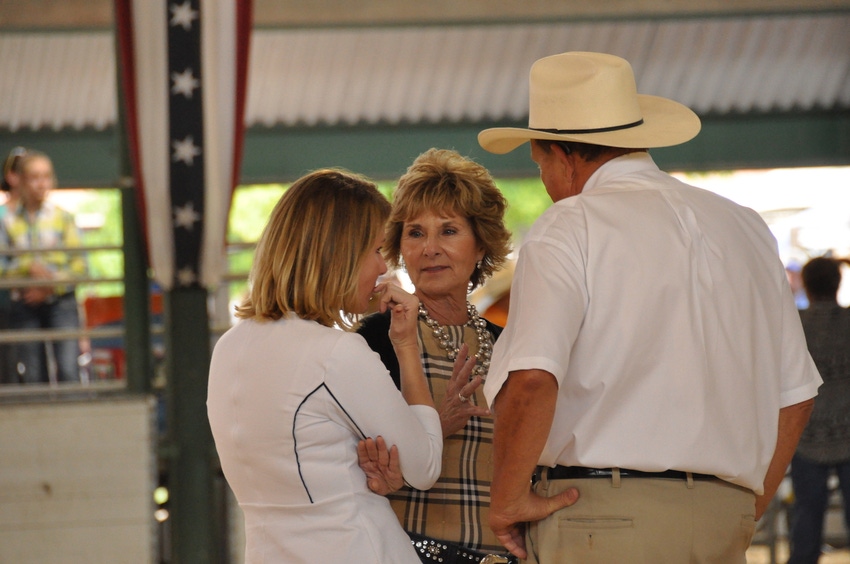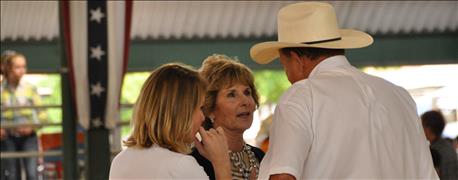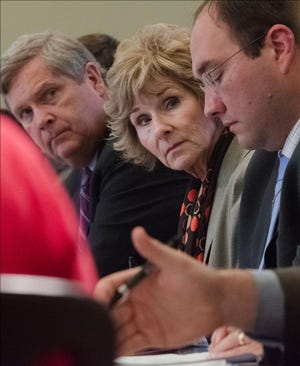
Colleen Callahan, the famed Peoria farm broadcaster, knows exactly when her life’s vision began. She was but 9 years old and had just managed to exhibit the champion barrow at the Chicago International Livestock Show. As the youngest ever to win the award, she was on the front page of every newspaper in town.
And then Orion Samuelson held a microphone in front of her and asked about her winning pig. He’d only been at WGN a few months himself. Looking back, Callahan says that was the pivotal moment when she knew what she wanted to do.
“I wanted to be the one asking the questions — and hopefully have an audience and have people learn from the answers to those questions,” she explains.

FAMILY AFFAIR: The Burns family — Dick, Colleen and Brittney — stepped into the ring together to judge the 2015 Illinois State Fair Junior Beef Showmanship contest.
And so she did. Callahan spent 32 years as a farm broadcaster and was appointed Illinois director of Rural Development in 2009; her appointment ends in January. Here’s a look at how she’s influenced Illinois agriculture — and how it's influenced her.
Where did life start for you?
Life started for me in Iroquois County, on a purebred Hampshire hog farm. As an only child, I grew up in an environment where I remember sitting around the table talking about everyday farm things, and being part of the conversation about decisions that really mattered — things like ordering feed and how much did we need. And my dad saying, "If we don’t have enough money to pay for something, we don’t need it." It was a wonderful childhood. And it started with chores. You just had to do it because it had to be done.

RURAL: Shown here with USDA Secretary of Agriculture Tom Vilsack (left), Colleen Callahan has served as USDA Rural Development director for Illinois since 2009. Of her approach to the office, Callahan says it’s been in “messaging, educating and informing.”
Whatever it is I’ve done or been recognized for or considered an accomplishment, it started with my mom and dad, who said, "You can do that." When I was standing in the living room watching the Channel 3 news and watching the market report during the noon news, I’d say, "I want to do that." And my mom would say, "You can do that." That’s continued with my husband, Dick (Burns). He’s always said, "You can do it."
You graduated from the University of Illinois in 1973 and started at WMBD in Peoria right away. What goals did you set for yourself at that point?
At that point, my goal was to get a job. I wanted to be in broadcasting, and at that point, there were no women doing ag broadcasting. I applied and interviewed at WMBD, knowing they would ask, "If we hire you, what will farmers think about hearing a woman talk about agricultural issues and markets?" My answer was that I would use my dad as the model listener of what he wanted to hear when he got up in the morning and when he came in at lunch. And hopefully if I could do that concisely, it shouldn’t matter whether it was a man, a woman or a dog barking out that information.
I started the day after Labor Day 1973. I stayed there 32 years.
How did your approach change over time?
I approached every day the first month or so with trepidation. And I remember interviewing a scientist and asking basic questions about how what he did affected me. What is aflatoxin? Is it in my food?
I found it was more interesting if interviews were conversational. People being interviewed are more comfortable if it’s conversational. Once I changed my approach, it was easier for me, for those being interviewed and better for the listeners.
I didn’t go in thinking, "What are farmers thinking of me?" If you do it that way, you’ll never succeed. You’ll always second-guess yourself. I just did what I thought was the right approach in interviewing people and providing what listeners needed.
What did you do in farm broadcasting that no one else could have?
I don’t think I did anything in farm broadcasting that no one else could have done. If I did something that was impactful, it was only in the manner in which I did it — how I approached it and how I presented it, and how I presented myself. While we may be representing an industry or questioning an industry, we should do that as who we are.
How do you approach a problem — and then solve it?
I learned that life isn’t about your circumstances; it’s about your choices. So when there’s an issue or a problem to solve, it is about how you approach it. When then-Secretary of Agriculture Ann Veneman asked me to accompany her to Afghanistan shortly after the war in Iraq began, I said no, mostly because I was scared — and then changed my mind, thanks to what my husband told me. Dick fought in Vietnam, and he explained that all you can ever do is react and respond.
We all like to think we’re in charge and in control. Life isn’t about your circumstances; it’s about your choices. And all any of us ever get to do is react and respond.
What was the moment like when you were asked to serve as Illinois Rural Development director — did President Barack Obama call you?
No, I didn’t get a call from the president! Sen. Dick Durbin was the highest-ranking elected official in the party, so his office contacted me about putting my name forward to serve. I did not know a lot about rural development at that moment. I figured if I had spent 32 years in ag broadcasting, and I didn’t know a lot about rural development, I assumed there were others who didn’t know a lot about it either. My approach was in messaging, in educating and informing.
What’s next for you?
I retire from USDA Rural Development on Dec. 31. But I’m not retiring. I don’t know what I’ll do next. But I like work. I think there’s a lot for us to do in the name of rural.
You’ve served on several boards and committees in your career. How do you build consensus?
It all begins with listening. When a situation is one that needs consensus, and where there is little or none, the only way you can approach it to try to bring agreement is by listening. And if you really have listened, you will be able to acknowledge and understand why that individual came to that opinion. You may not agree, but as long as you have said, "Help me understand," and have engaged in the process, it says you want to learn more. Maybe it changes your opinion slightly. It’s important to listen in all relationships — personal, professional, political.
What’s one thing you do that’s directly tied to your success?
I care. I care about agriculture. I care about rural. I care about the people who want to help others. I care about people who come to me and say, "I know we have this job opening, but I’ve never done an interview; can you help me?" I care about that person who says, "I want this, but I’m afraid."
Your daughter, Brittney Burns, is a Cook County assistant state’s attorney. What’s one lesson you wanted her to take away from her time at home?
Life isn’t fair. And it doesn’t exempt you from trying to make it that way. We have that conversation a lot. School, sports, college, work … throughout life, it never ends. Life isn’t fair, but it does not exempt you from trying to make it that way.
CALLAHAN REFLECTS
• On her job as a farm broadcaster:
“It’s my job to educate and to communicate; to explain, not complain.”
• On learning she’d made an inadvertent racial slur on air:
“I’d said farm people liked Earl Butz because he called a spade a spade, and then a listener called and told me that was a racial slur. I wondered, Have I led a sheltered life? Have I said other things out of context? It really took me back, and I will never forget it.”
• On leaving USDA Rural Development:
“I had not been a supervisor to a staff of 120 before, spread over the state in 12 field offices. I will really miss them, and I will miss the interaction and the supervisory role.”
• On what she admires in friends:
“Honesty. And trust. If you can’t have those two components, there’s no future to a relationship.”
CALLAHAN IN BRIEF
Truck? Ford
Tractor? John Deere
Livestock? Hampshire pigs
Team? Fighting Illini
Place to be? Outside at home
Favorite interview? Kids at the county fair
Technology? OnStar
Book? An interview with my uncle Gene Callahan
Hobby? Flower gardening
Favorite conversation? My mom and dad
Family? Husband Dick Burns; daughter Brittney Burns
Best decision? To listen
About the Author(s)
You May Also Like






